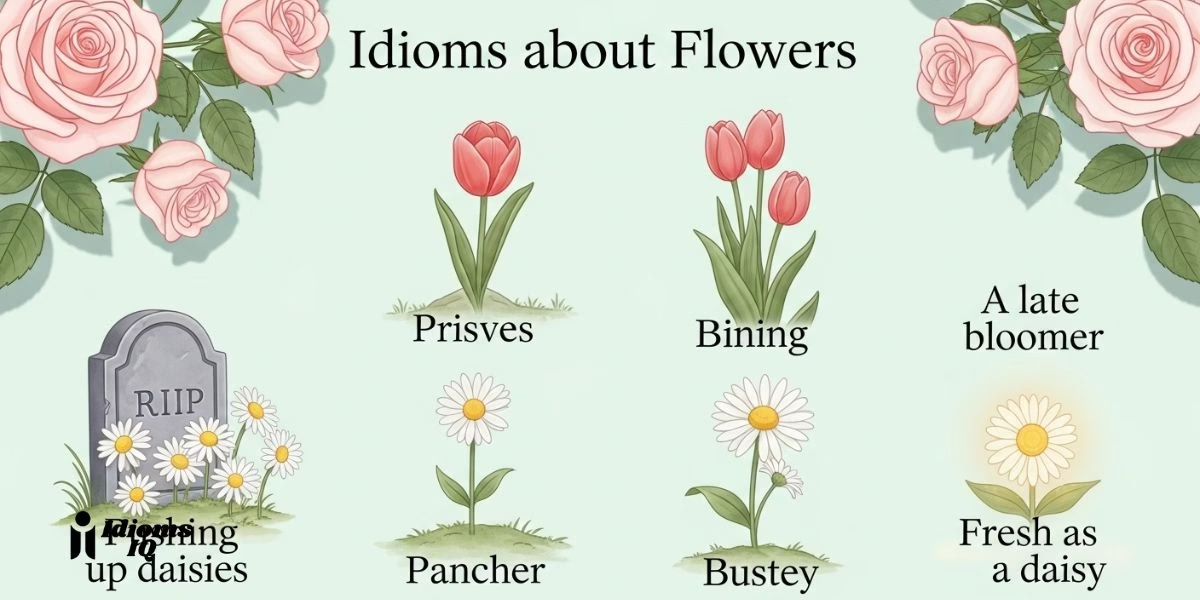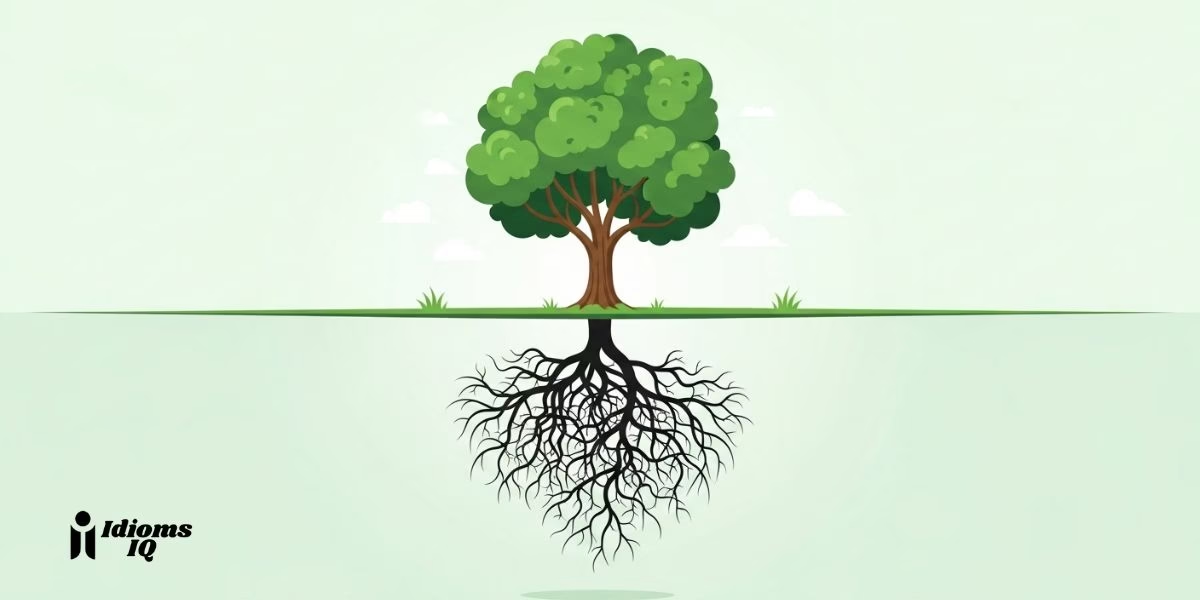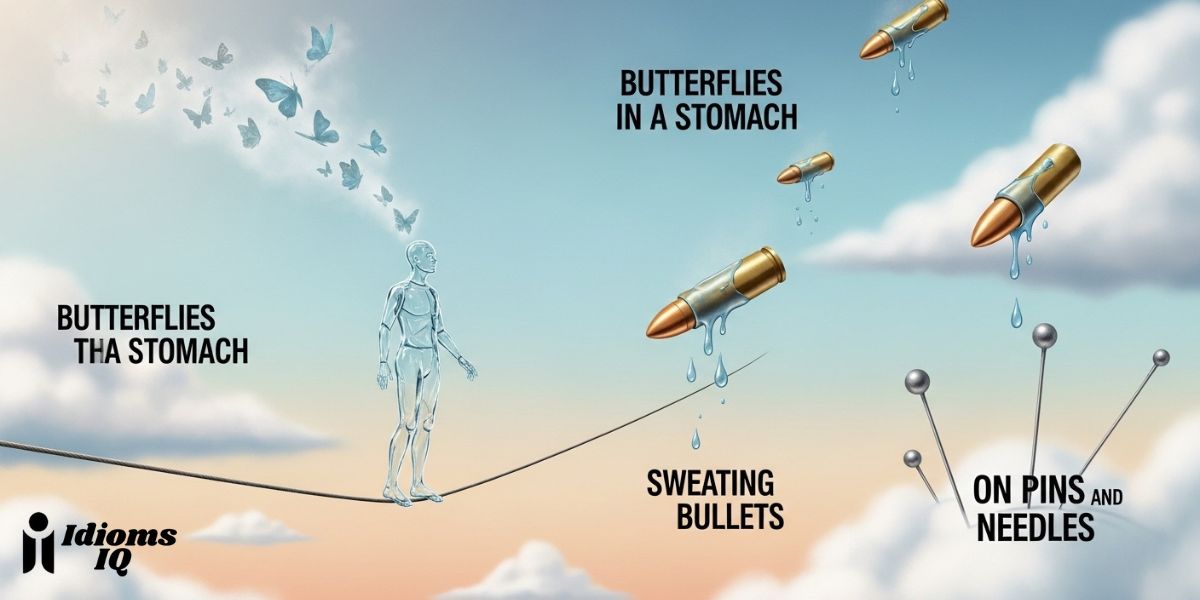
Flowers are more than just beautiful things to look at; they are woven into the very fabric of our language. We use them to talk about life, love, success, and failure. This is where we find the garden of idioms: those colourful phrases where the meaning isn’t what you’d expect from the individual words.
An idiom is a secret password in a language; when you say a situation is “no bed of roses,” you’re not talking about gardening you’re talking about life’s difficulties! In art and creative writing, flower idioms help our descriptions to bloom with personality and emotion. This article will explore 40 fantastic idioms related to flowers, helping your vocabulary to flourish.
Related: Idioms About Art
Why We Use Idioms in Art and Language
Idioms are the seasoning that gives a language its flavour and character. They add a layer of cultural history and wit that makes communication more vivid. In art and literature, idioms are a creative shorthand for complex feelings. Describing someone as a “shrinking violet” instantly paints a picture of a shy and timid personality. These expressions make dialogue sound more natural and descriptions more imaginative, helping to evoke emotion and create a stronger connection with the audience through a shared understanding of these poetic phrases.
Idioms about Flowers
Here is a garden of idioms to help your vocabulary grow, with notes on their tone and usage.
1. No Bed of Roses
- Meaning: A situation that is difficult, unpleasant, or full of hardship.
- Usage Example: “Starting a new business is no bed of roses; it requires a lot of hard work and sacrifice.”
- This is a very common idiom used to describe a challenging situation, contrasting it with the idea of a comfortable, luxurious life.
2. To Come Up Smelling of Roses
- Meaning: To emerge from a difficult situation with your reputation undamaged.
- Usage Example: “Despite the company scandal, the CEO managed to come up smelling of roses and got a new job immediately.”
- This idiom suggests that someone has managed to avoid blame or criticism, appearing innocent and perfect.
3. To Nip Something in the Bud
- Meaning: To stop a problem at an early stage before it can develop into something worse.
- Usage Example: “The teacher saw the students starting to argue and nipped the conflict in the bud before it became a fight.”
- This idiom uses the image of cutting off a flower bud before it can bloom.
4. A Shrinking Violet
- Meaning: A very shy, timid person who avoids attention.
- Usage Example: “She’s a brilliant artist, but she’s such a shrinking violet that she’s afraid to show her work to anyone.”
- This idiom compares a shy person to the small, delicate violet flower that often grows in the shade.
5. A Late Bloomer
- Meaning: Someone who develops their talents or finds success later in life than others.
- Usage Example: “The author was a late bloomer, publishing her first bestselling novel at the age of fifty.”
- This is a positive and encouraging idiom that celebrates success at any age.
6. Fresh as a Daisy
- Meaning: To feel energetic, refreshed, and full of life, especially after a good rest.
- Usage Example: “After a good night’s sleep, she woke up feeling as fresh as a daisy.”
- This idiom compares a person’s vibrant energy to a newly opened daisy flower in the morning.
7. Pushing Up Daisies
- Meaning: A humorous or informal way to say that someone is dead and buried.
- Usage Example: “If you don’t start looking after your health, you’ll be pushing up daisies before you know it.”
- This is a dark-humor idiom that refers to the flowers that might grow over a grave.
8. A Wallflower
- Meaning: A shy person who stands at the side of a social event instead of participating.
- Usage Example: “He was a wallflower at the school dance, too nervous to ask anyone to dance.”
- This term comes from the idea of someone standing against the wall at a party, like a decorative flower.
9. To Sow the Seeds of
- Meaning: To do something that will cause a particular result or feeling in the future.
- Usage Example: “His early lies sowed the seeds of distrust that eventually ruined their relationship.”
- This agricultural idiom can be used for both positive things (seeds of hope) and negative things (seeds of doubt).
10. The Root of the Problem

- Meaning: The fundamental cause of a problem or issue.
- Usage Example: “We can fix the symptoms, but we need to find the root of the problem to stop it from happening again.”
- This idiom uses the image of a plant’s root system as the hidden source of its life.
11. To Put Down Roots
- Meaning: To settle down and make your home in one place.
- Usage Example: “After years of traveling, they decided to put down roots and start a family in the small town.”
- This phrase compares the act of settling in a community to a tree growing its roots into the soil.
12. To Go to Seed
- Meaning: To deteriorate in condition or appearance due to neglect.
- Usage Example: “The once-beautiful garden had gone to seed after the owners moved away.”
- This idiom comes from the process of a plant finishing its flowering cycle and becoming withered.
13. To Reap What You Sow
- Meaning: To face the consequences of your past actions.
- Usage Example: “He never studied for his exams, so when he failed, his teacher told him that you reap what you sow.”
- This is a well-known proverb that uses the agricultural cycle of planting (sowing) and harvesting (reaping).
14. The Grass is Always Greener on the Other Side
- Meaning: People always think that other people’s situations are better than their own.
- Usage Example: “She wished she had a different job, but her friend reminded her that the grass is always greener on the other side.”
- This is a famous proverb about envy and the tendency to want what you don’t have.
15. To Gild the Lily
- Meaning: To add unnecessary decoration to something that is already beautiful.
- Usage Example: “Her dress was already stunning, adding that huge necklace was just gilding the lily.”
- This idiom, often mistakenly attributed to Shakespeare, means to spoil something by trying to improve it.
16. The Last Rose of Summer
- Meaning: The last remaining person or thing from a particular group or era.
- Usage Example: “As the only one from her graduating class still living in their hometown, she felt like the last rose of summer.”
- This poetic phrase comes from a famous poem by Thomas Moore and evokes a feeling of gentle, lonely nostalgia.
17. A Budding (Artist, Romance, etc.)
- Meaning: Someone or something that is in an early stage of development but shows a lot of promise.
- Usage Example: “The young painter is a budding artist who is already winning awards.”
- This idiom compares the early stages of talent or a relationship to a flower bud that is about to bloom.
18. To Blossom
- Meaning: To develop in a healthy and promising way; to become more confident and beautiful.
- Usage Example: “After she moved to the new school, her confidence began to blossom.”
- This verb is used to describe a person’s positive growth and flourishing.
19. A Thorny Issue
- Meaning: A problem or subject that is difficult, complicated, and unpleasant to deal with.
- Usage Example: “The issue of budget cuts has become a thorny issue for the city council.”
- This idiom uses the image of a rose’s sharp thorns to describe a painful or tricky problem.
20. Every Rose Has Its Thorn

- Meaning: Even beautiful or pleasant things have an unpleasant or difficult aspect.
- Usage Example: “She loved her new job, but the long commute was difficult. It just shows that every rose has its thorn.”
- This is a well-known proverb that advises that nothing is perfect.
21. A Primrose Path
- Meaning: A life of ease and pleasure that ultimately leads to ruin or destruction.
- Usage Example: “He inherited a lot of money and spent his youth following the primrose path of parties and gambling.”
- This is a literary idiom, famously used in Shakespeare’s Hamlet, to describe a deceptively easy but dangerous lifestyle.
22. To Stop and Smell the Roses
- Meaning: To slow down, appreciate the simple beauties in life, and be present in the moment.
- Usage Example: “You’re working too hard. You need to take a vacation and stop and smell the roses.”
- This is a very common piece of advice that encourages mindfulness and relaxation.
23. Flowery Speech
- Meaning: Language that is very elaborate, ornate, and full of complicated words or imagery.
- Usage Example: “The politician’s flowery speech was full of grand promises but lacked any real substance.”
- This can be a negative term, implying that the language is overly complicated and perhaps insincere.
24. The Flower of Youth
- Meaning: The best, most vibrant, and energetic period of being young.
- Usage Example: “The old soldier remembered being in the flower of his youth, feeling strong and invincible.”
- This poetic phrase describes youth as a time of peak beauty and vitality, like a flower in full bloom.
25. To Have a Green Thumb (or Green Fingers)
- Meaning: To be skilled at gardening and making plants grow.
- Usage Example: “My grandmother has a real green thumb; her garden is the most beautiful on the street.”
- This idiom is a common compliment for a talented gardener.
26. To Lead Someone Down the Garden Path
- Meaning: To deceive or mislead someone.
- Usage Example: “The salesman led us down the garden path, making promises about the product that weren’t true.”
- This idiom suggests a pleasant and deceptive journey that ends in a bad place.
27. The Pick of the Bunch
- Meaning: The very best person or thing from a group of choices.
- Usage Example: “All the applicants were good, but she was clearly the pick of the bunch.”
- This idiom compares choosing a person or thing to picking the best flower from a bouquet.
28. To Be in Clover
- Meaning: To live a life of ease, comfort, and prosperity.
- Usage Example: “After he won the lottery, he was in clover for the rest of his life.”
- This idiom comes from the image of cows happily grazing in a rich field of clover.
29. As Welcome as Flowers in May
- Meaning: To be very welcome; to be a joyful and pleasing sight.
- Usage Example: “After the long, cold winter, the first warm day was as welcome as flowers in May.”
- This is a classic and cheerful idiom that equates a person or thing with the joy of spring’s arrival.
30. A Tall Poppy

- Meaning: A person who is conspicuously successful and whose success attracts envy or criticism.
- Usage Example: “In that competitive office, if you achieve too much, you become a tall poppy, and others will try to cut you down.”
- “Tall poppy syndrome” is a common term in Australia and New Zealand for the tendency to criticize successful people.
31. To Wilt Under Pressure
- Meaning: To lose energy, confidence, and determination when in a stressful situation.
- Usage Example: “He was a great player in practice, but he tended to wilt under the pressure of a real game.”
- This idiom compares a person’s loss of strength to a flower drooping in the heat or without water.
32. Oops-a-Daisy
- Meaning: A playful, affectionate exclamation said to a child who has stumbled or fallen over.
- Usage Example: “Oops-a-daisy! Let’s get you brushed off.”
- This is a gentle and endearing phrase, often used to make a small accident seem less serious.
33. To Beat Around the Bush
- Meaning: To avoid talking about what is important or to approach a topic in an indirect way.
- Usage Example: “Stop beating around the bush and just tell me what’s wrong.”
- This idiom originates from the practice of hunters beating bushes to flush out their game, rather than approaching it directly.
34. Wall-to-Wall
- Meaning: A phrase describing something that covers an entire area completely.
- Usage Example: “The festival was a huge success, with wall-to-wall people in the main square.”
- While it can be used for anything (like carpet), it is famously associated with the phrase “wall-to-wall tulips” from the Tulip Mania historical event.
35. To Plant an Idea
- Meaning: To introduce an idea to someone in the hope that it will grow and develop in their mind over time.
- Usage Example: “She planted the idea of a vacation in his mind, and a week later, he was looking up flights.”
- This metaphor compares the sharing of an idea to planting a seed.
36. To Come Out of Your Shell
- Meaning: To overcome shyness and become more confident and sociable.
- Usage Example: “Since joining the drama club, she has really come out of her shell.”
- This idiom compares a shy person to a creature hiding in a shell or a flower bud opening up.
37. To Grow Like a Weed
- Meaning: To grow very quickly and uncontrollably.
- Usage Example: “My nephew is only ten, but he’s already as tall as me! He’s growing like a weed.”
- While weeds are often undesirable, this idiom is used neutrally or positively to describe rapid growth.
38. A Budding Genius
- Meaning: A person who is showing early signs of great intelligence, talent, or potential.
- Usage Example: “The ten-year-old chess champion is a budding genius who is already competing with grandmasters.”
- This idiom compares the raw potential of a talented youth to a flower bud that is about to bloom spectacularly.
39. To Bloom Where You Are Planted
- Meaning: To thrive and make the best of your current situation, whatever it may be.
- Usage Example: “She didn’t get into her first-choice university, but she decided to bloom where she was planted and made the most of it.”
- This is an encouraging proverb that advises people to find success and happiness in their given circumstances.
40. To Be a Delicate Flower

- Meaning: To be sensitive, easily upset, or physically fragile.
- Usage Example: “You have to be careful with your words around him; he can be a bit of a delicate flower.”
- This idiom is often used to describe someone who needs to be handled with care, though it can sometimes be used critically to imply someone is too sensitive.
Practice Your New Vocabulary: Fill in the Blanks
Ready to let your idiom skills blossom? Fill in the blanks with the best phrase from the list.
- He’s a very shy person who tends to be a ________________ at large parties.
- If we don’t deal with this small issue now, it will grow into a huge problem. We need to ________________.
- She’s been feeling great ever since she got some rest; she’s as ________________ this morning.
- He’s a very talented musician for his age, a real ________________ artist.
- Life as a single parent is certainly ________________.
- You need to relax and take a break from work. Try to ________________!
- The real cause of the company’s failure is poor management; that’s the ________________.
- I know you’re nervous about moving, but I’m sure you will ________________ where you are planted.
- He was a talented actor who found fame late in life, a classic ________________.
- She has a magical ability with plants; she must have a ________________.
Answers
- wallflower
- nip it in the bud
- fresh as a daisy
- budding
- no bed of roses
- stop and smell the roses
- root of the problem
- bloom
- late bloomer
- green thumb
Conclusion
Flower idioms add a layer of natural beauty, symbolism, and poetry to our language. They allow us to talk about complex human experiences using the simple, universal language of the garden. By using these expressions, you can make your conversations and writing more vibrant, creative, and emotionally resonant.
We encourage you to let your vocabulary blossom by planting these idioms in your everyday speech and watching your communication skills grow. If you enjoyed this collection, continue your journey by exploring our other articles on figurative language to find the perfect words for any occasion!






